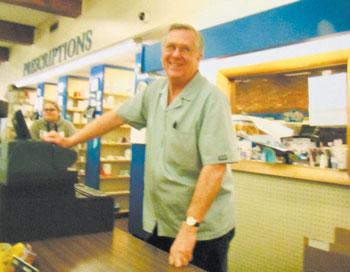 The final days of 2017 marked the end of an era in Hope Mills when Bobby Henley locked the doors of Clinic Pharmacy on South Main Street for the last time.
The final days of 2017 marked the end of an era in Hope Mills when Bobby Henley locked the doors of Clinic Pharmacy on South Main Street for the last time.
Henley, who took over from his father, the late John Henley Sr., sold the business after it had been in his family for 72 years, deciding it was time to retire.
His father, a former mayor of Hope Mills who rose to prominence as one of the highest-ranking members of the North Carolina State Senate, started the pharmacy in conjunction with a small hospital in Hope Mills after moving there from Cary, following World War II. The senior Henley, who died in 2012 at the age of 90, was born in Wadesboro but left there after the Great Depression and relocated to Cary.
The original drug store was across the street from the current location, next to the now long-departed hospital. The current pharmacy was constructed in 1960 and has been at that location ever since.
Bobby Henley said that when Hamilton-Porter Funeral Home closed its doors some years ago, owner Ken Porter told him that made Clinic Pharmacy the oldest business in the town.
Young Bobby had been a part of Clinic Pharmacy since he was 9 years old, sweeping and mopping at the drugstore.
“I always enjoyed dealing with people,’’ said the younger Henley, now 68.
When it came to considering a career, he never thought of anything but pharmacy. He enrolled in the University of North Carolina at Chapel Hill where he earned his pharmacist credentials and came back to Hope Mills to the family business in 1977.
He would continue to work at the pharmacy until Dec. 31 of last year.
“Pharmacy has changed a lot because of all the government and insurance,’’ Henley said. “It’s just not what it was even 10 years ago.’’
Henley said he got a chance to sell his business to another independent drugstore owner instead of one of the chain operations. “I felt the business would survive and do well,’’ he said.
He’ll be leaving behind the headache of mounting paperwork in the business, plus increased training for things like fraud, waste and abuse.
“It’s the same phenomenon going on with doctors,’’ Henley said. “They’re selling out to the hospitals because they are tired of doing all that paperwork and all that regulation on them.”
Henley added he’s not opposed to regulations and understands the need for them but that the grind has just become too much. “It’s like three to four hours to fill out all the forms and do this and that,’’ he said. “It gets old after 45 years.’’
But Henley takes plenty of good memories with him into retirement. “We’ve been fortunate,’’ he said. “We survived. There have been a lot of pharmacies that haven’t.’’
Henley had a simple philosophy on how to compete with the big chain drugstores: Reach out to customers with personalized service and go the extra mile the chains sometimes won’t.
“Our prices were equal to or better than the chains a lot of times,’’ he said. “People don’t check the prices. Brand and generic drugs are priced so differently.’’
Henley said he’s had cases where people have told him some of his drugs sold for as much as $50 cheaper per prescription than the same drug at a chain pharmacy.
“People don’t necessarily check that,’’ Henley said. “Because of ads, they were willing to wait hours for prescriptions to be filled instead of being in and out in 15 minutes.’’
Good prices aren’t the only things that small drugstores like Clinic Pharmacy offer. Henley said other small operations specialize in the lost art of compounding medications to develop more effective, personalized treatment for patients.
It is that part of the business Henley will miss most, he said – his customers, or as he called them, his patients.
“Some of these people I’ve known since I was knee-high to a grasshopper,’’ Henley said.
He said the drugstore and the pharmacy counter were kind of a meeting place, not unlike the barber shop in the “Andy Griffith” television show of the 1960s.
“People would come in and see each other, stay 20 or 30 minutes, talking and joking,’’ Henley said. “Certain people, the only place I saw them was in the drugstore. They have been mighty, mighty kind to us over 72 years.’’
As for the future, Henley is looking forward to having most Saturdays off and spending some long weekends at his place at Lake Waccamaw.
He also wants to golf, something he hasn’t done much of for the last three or four years, but he’s not totally walking away from his job as a pharmacist.
“I’ll do a little relief work when other independents might need me to help them out,’’ Henley said. “I wouldn’t mind doing some of that just to get my hand in.’’
Even though he won’t be around anymore, Henley hopes his old place of business continues to thrive. “They’ve got a mighty fine person taking over in Joe Williams,’’ he said. “I hope they’ll give him a chance and get to know him. I think he’s going to be an asset to the town of Hope Mills.’’
Just like Henley and his family have been.
Photo: L: Bobby Henley